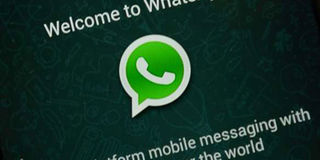WhatsApp will win battle of meaning in election

A logo for the messaging app WhatsApp Messenger on a smartphone. PHOTO | STAN HONDA | NATION MEDIA GROUP
What you need to know:
- Spectacular fluidity, incredible spontaneity and freewheeling creative instincts have turned WhatsApp into a platform to watch come electioneering season.
- However, what we should appreciate is that WhatsApp is erratic and capricious. The heat and hilarity its messages generate fit perfectly for a political discourse where sense recedes and the emotion reigns.
Elections the world over are won by perceptions more than truth. And perception, especially among the masses, is mainly a construct of narratives aided by the use of the dominant medium of the day.
In 2008, Myspace and Facebook helped to propel Barack Obama to the White House. In 2017, for Kenya, the platform where the power of political messaging will be tested is in the most unlikely of mediums: WhatsApp.
This humble app is part of the instant messaging empire. It is ubiquitous, versatile, prolific and inexpensive. What is more? WhatsApp’s proficiency to effortlessly construct and transmit audio, video, graphics, pictures and text right to the palm of users, makes it both a darling and a villain.
With an explosion of smartphones, about 20 million users in Kenya, and the availability of data bundles and hotspots, WhatsApp usage is increasingly becoming a default medium of communication.
Meme producers will have a field day dramatising and parodying every statement that can be parodied.
WhatsApp is a world of small intricate and overlapping groups whose dynamics of spirited debates are incredible. Here, information slithers on the vines of technology and mutate in meaning and content. The various groups play well into the in-group instincts of fear, vulnerability, strength and hope, while similarly tearing opponents apart. This realm and reality is natural fit for political conversations. In short, WhatsApp is where the pulse of political discourse will reign.
BREAKING NEWS
While Twitter and Facebook, which are elitist, will hold the mantle for breaking news in real time, WhatsApp will play a subtle role of meaning-making. Users will interrogate claims made by politicians and create new meanings.
The WhatsApp ecosystem operates like small communities. News of the day is intensely assessed. You can be sure that with this medium, the narrative will be a cocktail of exaggerated truths and lies, agreements and disagreements, facts and what US President Donald Trump calls “alternative facts”.
Ultimately, WhatsApp influences thought, perception, attitudes and behaviours. It is the sublime effect of the messages that are likely to determine decisions at the ballot.
The fact that users are also content producers gives them ownership and therefore allows them to hold fast to the meaning they construct and ideologies they profess.
On WhatsApp, narratives are shorter, wittier and appealing directly to the individual — all crucial for capturing imaginations and reaffirming beliefs.
However, because the attention of users is fleeting, it is counterproductive to flood audiences with complex or multiple meanings in one message.
Universally, effective messaging shares two key traits: wittiness and pithiness.
PROPAGATING IDEOLOGIES
For political messaging, WhatsApp mostly relies on the passions of the users. The more jingoistic one’s supporters or rivals are, the more aggressive they will be in propagating their candidates’ or parties’ ideologies and countering their rivals’ messages. It is a two-way highway.
The era of passive consumption of messaging may well be over. Indeed, it would have been easier to control and shape debate if society relied on traditional media. Not anymore. Absolute control over messaging is going to be a slippery affair because most of the information published or broadcast on mainstream media will acquire a new life. WhatApp groups will quickly transform the mass messages to group platforms and analyse, redesign and even parody and then recast the same with completely different meanings to suit their persuasions.
These spectacular fluidity, incredible spontaneity and freewheeling creative instincts have turned WhatsApp into a platform to watch come electioneering season.
However, what we should appreciate is that WhatsApp is erratic and capricious. The heat and hilarity its messages generate fit perfectly for a political discourse where sense recedes and the emotion reigns.
Eric Wamanji is a public relations expert.
Twitter: @manjis





